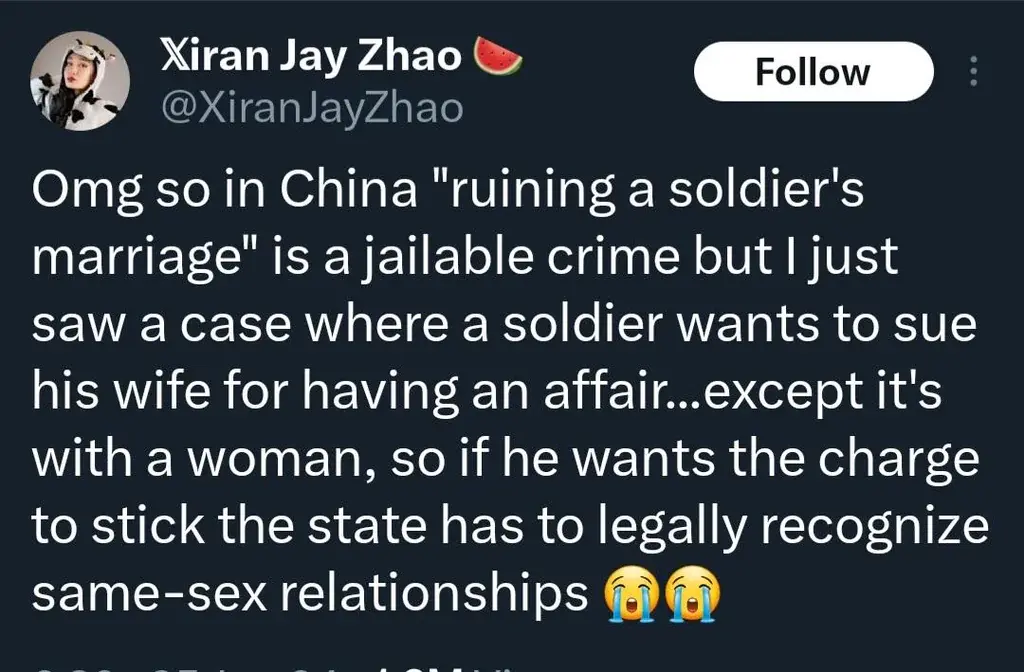this post was submitted on 26 Jun 2024
114 points (96.0% liked)
chapotraphouse
13823 readers
694 users here now
Banned? DM Wmill to appeal.
No anti-nautilism posts. See: Eco-fascism Primer
Slop posts go in c/slop. Don't post low-hanging fruit here.
founded 4 years ago
MODERATORS
you are viewing a single comment's thread
view the rest of the comments
view the rest of the comments

Hmm, the person tweeting this (as far as I can tell, they're not living in China currently, and is some 1st gen Chinese Canadian YA author who writes Chinese history-inspired fantasy/SF) provided some "elaboration" on the alleged situation:-
Not sure about the anonymous "Chinese lawyer" source that they're relying on, and I can't find a news source reporting on this case; elsewhere in the thread they posted an SCMP article, but it was about a "coventional" heterosexual jody case from earlier this year). Be that as it may, on first glance, the purpoted legal logic doesn't seem to be completely without legs to me? If cohabitation is legally defined as "living as if husband and wife", it seems at least arguable (not saying that it's an argument that Chinese courts will definitely accept) that the court cannot legally recognise a "lesbian cohabitation" situation without first recognising the concept of a marriage/legally-recognised union between two women?
I think it's a really flimsy argument tbh.
Say for example a wife of a PLA soldier has an affair with a married man and they live together, eat together, go on dates together, fuck, etc. The male adulterer would not be able to actually marry the soldier's wife because bigamy is illegal. I don't think it would fly for a second to argue that the male adulterer can't be convicted because the Court would be recognizing bigamy.
I'm not a trained Chinese lawyer or anything, but if the English translation of "as if" is accurate then there's a ton of leeway for interpretation.
What we don't know, is the law meant to be used to punish infidelity or to punish somebody taking advantage of a lonely spouse of a deployed soldier?
I'd imagine that if the law was meant to "protect a lonely spouse from being taken advantage of" it wouldn't matter which gender the stay behind spouse was interacting with.
That interpretation sounds like a plausible socially progressive reading of the law, given that there's a proviso to address cases where a person rapes a military spouse "by means of violence, coercion or other means" (it refers such cases to Article 236, which concerns cases of rape by violence or coercion in general). One could argue the addition of this proviso implies that the entire article is intended to be read as a law to protect the welfare of military spouses, addressing different ways a man could take advantage of a lonely military spouse, either by dishonest seduction (dishonest because conviction under the law requires proof of the man knowing that the woman is already married), or by force/abuse of position. The relevant clause of the Chinese criminal law code reads:
Of course, the broad way that the law is phrased reveals big blindspot in the provision, as it kinda fails to consider or address a possibie situation where a military spouse could or would want to exercise agency by actively seeking out affairs while their spouse is deployed.
Edit: Actually, upon reading the criminal law code further I realise that it also contains a general criminalisation of bigamy in Article 258 (anyone "who has a spouse and commits bigamy, or who marries another person knowing that the other person has a spouse" can get up to two years imprisonment). So, I guess in cases where a military spouse actually remarries while the soldier is deployed, that would also open her (or him/them) up to some criminal liability. However, if she's "merely" having an affair, or cohabiting, she's technically not liable for any crime. Which means, on a structural level, the law is a little more lenient on the military spouse as compared to the jody. This further supports the argument that it's more accurate to read Article 259, which addresses only the person seeking to marry or cohabit with the military spouse, as theoretically aimed at protecting military spouses from being taken advantage of while their husbands are deployed instead of it being a law meant to punish military spouse infidelity, since it distinctly doesn't seek to punish the cheating military spouse like Article 258 does for general bigamy. If Article 259 was intended to punish all military spouse infidelity, it logically would need to treat both the military spouse and the person they cheated similarly.
Hexbear commenters, best-bear commenters.